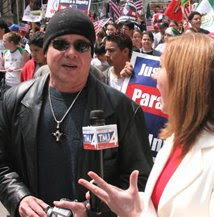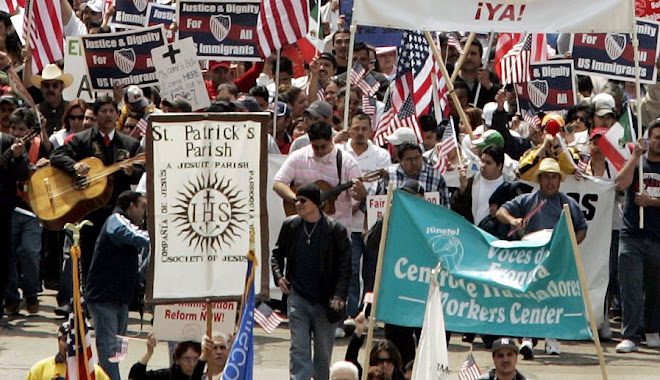Photo: Internet file
May 1, immigration reform and workers rights march rallys planned, economic boycott limiting spending to bare essentials only continues
By H. Nelson Goodson
April 21, 2010
Washington D.C. - Bi-partisan political insiders from both the House of Representatives and the U.S. Senate indicate that before any steps would be taken to resurge a comprehensive immigration reform bill, the U.S. border must be secured. The primary issue would be, if the state national guards along the U.S. border and the U.S. Customs and Border Protection would be authorized by Congress to work together in securing the border.
Once the border is secured, debate might follow by introducing a U.S. Senate bill on immigration reform. The House of Representatives already have their version, the Comprehensive Immigration Reform for America's Security and Prosperity (CIR ASAP) Act of 2009, H.R. 432 bill submitted by U.S Congressman Luis Gutierrez (Dem.-IL) in December.
The Whitehouse confirmed on Tuesday, that President Barack Obama is trying to bring the immigration reform issue back into the table, after failing to address it during his first year in office. The President even on Tuesday called U.S. Senator Scott Brown (Rep.-Mass.) from Air Force One to bring him on board to support immigration reform, but Brown's priorities continue to be the current economy and creating jobs.
On Tuesday, Senate Majority Leader Harry Reid met with House Speaker Nancy Pelosi and other democratic leaders to discuss immigration reform. Currently, a bipartisan Immigration Reform bill is being put together by both U.S. Senators Lindsey Graham (Rep.-S.C.) and Charles Schumer (Dem.-N.Y.), which the Obama administration supports.
Reid plans to introduce the immigration bill by next month, but it could cost the Democrats some seats in November. Democrats have become unpopular for their support in passing Obama's Health Care Plan.
Even, the Republicans in Congress have vowed to oppose any immigration reform bill as a consequence to Democrats passing the federal Health Care Plan.
Republicans allege that Democrats while campaigning for re-election are promising Latinos they would address the immigration reform issue, to get their support for the mid-term elections in November. But, Republicans say Democrats are making empty promises and President Obama's failure to aggressively push for immigration reform last year, reinforces the issue is dead for 2010.
Latinos have learned not to trust Democrats, according to Republicans. The GOP is now considering to attract the Latino vote for the November elections. Nationally, Latinos seemed to be pulling away from the Democrats, blaming them (as a majority in Congress) for their lack of support in passing an immigration reform bill for 2010.
The GOP hopes to reclaim Congress as a majority and the Whitehouse by convincing its members and extreme conservative Rebublicans to support an immigration reform bill.
In 2006, U.S. Hispanics were instrumental in electing a majority of Democrats in Congress and in 2008, helped elect President Barack Obama (Dem.-IL), the first African-American to take office.
Every year, an estimated 400,000 U.S. Hispanics become eligible voters, when they turn 18. One of six Americans is Hispanic, and in 2009, their combine purchasing power reach $917 billion and by 2013, their combine economic buying power will reach $1.3 trillion.
On March 21, more than 200,000 supporters for Immigration Reform gathered in Washington D.C. for the "March for America" rally to push Congress and President Obama to address and pass an immigration reform bill in 2010.
During the same day, a U.S. Economic Boycott was called for action from Wisconsin, and began to take effect until an immigration reform bill is passed. Latinos were encouraged to show their economic purchasing power by limiting their spending to bare essentials only.
Hispanics and undocumented workers are taken for granted in the U.S. economy. They are considered as spenders and not savers. If Latinos do accomplish their objective in managing expenditures, they will no doubt become a powerful economic force to reckon with. Their economic influence could lead and most likely result in the passage of an immigration reform bill.
On May 1, immigration reform activists, organizations and groups have planned marches throughout the country in support of immigration reform and workers rights in conjunction with May Day events. May Day, which is synonymous with International Workers' Day, or Labour Day, becomes a day of political demonstrations and celebrations organised by the unions, anarchist, and socialist groups.
Connected by MOTOBLUR™ on T-Mobile
May 1, immigration reform and workers rights march rallys planned, economic boycott limiting spending to bare essentials only continues
By H. Nelson Goodson
April 21, 2010
Washington D.C. - Bi-partisan political insiders from both the House of Representatives and the U.S. Senate indicate that before any steps would be taken to resurge a comprehensive immigration reform bill, the U.S. border must be secured. The primary issue would be, if the state national guards along the U.S. border and the U.S. Customs and Border Protection would be authorized by Congress to work together in securing the border.
Once the border is secured, debate might follow by introducing a U.S. Senate bill on immigration reform. The House of Representatives already have their version, the Comprehensive Immigration Reform for America's Security and Prosperity (CIR ASAP) Act of 2009, H.R. 432 bill submitted by U.S Congressman Luis Gutierrez (Dem.-IL) in December.
The Whitehouse confirmed on Tuesday, that President Barack Obama is trying to bring the immigration reform issue back into the table, after failing to address it during his first year in office. The President even on Tuesday called U.S. Senator Scott Brown (Rep.-Mass.) from Air Force One to bring him on board to support immigration reform, but Brown's priorities continue to be the current economy and creating jobs.
On Tuesday, Senate Majority Leader Harry Reid met with House Speaker Nancy Pelosi and other democratic leaders to discuss immigration reform. Currently, a bipartisan Immigration Reform bill is being put together by both U.S. Senators Lindsey Graham (Rep.-S.C.) and Charles Schumer (Dem.-N.Y.), which the Obama administration supports.
Reid plans to introduce the immigration bill by next month, but it could cost the Democrats some seats in November. Democrats have become unpopular for their support in passing Obama's Health Care Plan.
Even, the Republicans in Congress have vowed to oppose any immigration reform bill as a consequence to Democrats passing the federal Health Care Plan.
Republicans allege that Democrats while campaigning for re-election are promising Latinos they would address the immigration reform issue, to get their support for the mid-term elections in November. But, Republicans say Democrats are making empty promises and President Obama's failure to aggressively push for immigration reform last year, reinforces the issue is dead for 2010.
Latinos have learned not to trust Democrats, according to Republicans. The GOP is now considering to attract the Latino vote for the November elections. Nationally, Latinos seemed to be pulling away from the Democrats, blaming them (as a majority in Congress) for their lack of support in passing an immigration reform bill for 2010.
The GOP hopes to reclaim Congress as a majority and the Whitehouse by convincing its members and extreme conservative Rebublicans to support an immigration reform bill.
In 2006, U.S. Hispanics were instrumental in electing a majority of Democrats in Congress and in 2008, helped elect President Barack Obama (Dem.-IL), the first African-American to take office.
Every year, an estimated 400,000 U.S. Hispanics become eligible voters, when they turn 18. One of six Americans is Hispanic, and in 2009, their combine purchasing power reach $917 billion and by 2013, their combine economic buying power will reach $1.3 trillion.
On March 21, more than 200,000 supporters for Immigration Reform gathered in Washington D.C. for the "March for America" rally to push Congress and President Obama to address and pass an immigration reform bill in 2010.
During the same day, a U.S. Economic Boycott was called for action from Wisconsin, and began to take effect until an immigration reform bill is passed. Latinos were encouraged to show their economic purchasing power by limiting their spending to bare essentials only.
Hispanics and undocumented workers are taken for granted in the U.S. economy. They are considered as spenders and not savers. If Latinos do accomplish their objective in managing expenditures, they will no doubt become a powerful economic force to reckon with. Their economic influence could lead and most likely result in the passage of an immigration reform bill.
On May 1, immigration reform activists, organizations and groups have planned marches throughout the country in support of immigration reform and workers rights in conjunction with May Day events. May Day, which is synonymous with International Workers' Day, or Labour Day, becomes a day of political demonstrations and celebrations organised by the unions, anarchist, and socialist groups.
Connected by MOTOBLUR™ on T-Mobile






No comments:
Post a Comment